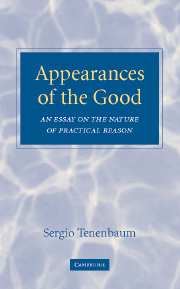Book contents
- Frontmatter
- Contents
- Acknowledgments
- Appearances of the Good
- Introduction
- 1 The Basic Framework: Desires as Appearances
- 2 The Basic Framework: From Desire to Value and Action
- 3 The Subjective Nature of Practical Reason
- 4 The Objective Nature of Practical Reason
- 5 Deontological Goods
- 6 Motivation without Evaluation? Unintelligible Ends, Animal Behavior, and Diabolical Wills
- 7 Evaluation and Motivation Part Company? The Problem of Akrasia
- 8 Evaluation without Motivation? The Problem of Accidie
- Bibliography
- Index
8 - Evaluation without Motivation? The Problem of Accidie
Published online by Cambridge University Press: 25 August 2009
- Frontmatter
- Contents
- Acknowledgments
- Appearances of the Good
- Introduction
- 1 The Basic Framework: Desires as Appearances
- 2 The Basic Framework: From Desire to Value and Action
- 3 The Subjective Nature of Practical Reason
- 4 The Objective Nature of Practical Reason
- 5 Deontological Goods
- 6 Motivation without Evaluation? Unintelligible Ends, Animal Behavior, and Diabolical Wills
- 7 Evaluation and Motivation Part Company? The Problem of Akrasia
- 8 Evaluation without Motivation? The Problem of Accidie
- Bibliography
- Index
Summary
Accidie seems to be a phenomenon in which evaluation and motivation come completely apart, the kind of phenomenon that could only be explained by a separatist view. Someone who suffers from accidie supposedly still accepts that various things are good or valuable but is not motivated to pursue any of them. This phenomenon seems harder to accommodate within the framework of the scholastic view than akrasia because here there is not a different (even if lesser) good that motivates the agent. At any rate, our way of explicating akrasia by means of the scholastic view does not seem to have any straightforward application to the cases of accidie; it is quite implausible to say that an agent who is in the state of accidie is somehow persuaded by an appearance of the good of, say, “staying put.”
I will try to show in this chapter how one can account for accidie within the scholastic view. This account will depend on defining a relation I call “conditioning,” a relation that may obtain between certain states of affairs and evaluative perspectives. Roughly, an evaluative perspective is conditioned by a state of affairs if and only if whether the objects that appear to be good from this perspective should be allowed into one's general conception of the good depends on whether that state of affairs obtains. I will argue that the person suffering from accidie takes certain evaluative perspectives to be conditioned by certain states of affairs.
- Type
- Chapter
- Information
- Appearances of the GoodAn Essay on the Nature of Practical Reason, pp. 283 - 298Publisher: Cambridge University PressPrint publication year: 2007



